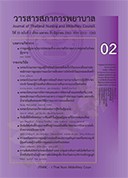Impact of Brain Exercise Programme on Older Adults’ Cognition
Keywords:
brain exercise, cognition, older adultsAbstract
Abstract
Objectives: To compare older adults’ cognition before and after receiving a brain exercise programme.
Design: One-group quasi-experimental research with a pre-test and a post-test.
Methodology: The participants, recruited via random sampling, were 30 older adults living in Bang Sai sub-district, Muaeng Chon Buri district, Chonburi province. Data collection was conducted from May to July 2018. The instruments consisted of 1) a demographic data form; 2) Montreal Cognitive Assessment (MoCA); and 3) a six-week brain exercise programme. In the frst week, the brain exercise programme focused on educating the participants on dementia and its prevention. From the second to the sixth weeks, the programme engaged the participants in weekly three-hour sessions of brain-exercising activities and practices. The outcome of the programme was evaluated in the tenth week. The data were analysed using descriptive
statistics and paired t-test.
Results: After participating in the brain exercise programme, the older adults’ average cognition score was higher than that before the intervention (p < .001). Category-wise, the participants displayed signifcant cognitive improvement in visuospatial/executive, name recognition, concentration, and delayed recall areas (p = .007; p = .018; p = .005; and p = .008, respectively). However, no signifcant differences were found between their pre- and post-intervention mean scores on language use, abstraction, and orientation (p > .05).
Recommendations: The fndings of this preliminary study proved that this brain exercise programme could stimulate older adults’ cognition. However, it is recommended that the study be repeated and include a control group, so as to more accurately measure the effectiveness of the programme before applying it to older adults in general.
Downloads
References
Mattson MP. Cellular and neurochemical aspects of the aging human brain. In Halter, JB, Ouslander JG,
Tinetti ME, Studenski S, editors. Hazzard’s geriatric medicine and gerontology. 6thed. New York:Mc
Graw-Hill; 2009, pp. 739-50.
Ganguli M, Blacker D, Blazer DG, Grant I, Jeste DV, Paulsen JS, et al. Classifcation of neurocognitive disorders in DSM-5: a work in progress. Am J Geriatr Psychiatry. 2011; 19(3): 205–10.
Grady CL. The cognitive neuroscience of ageing. Nat Rev Neurosci. 2012;13:491-505.
Blazer DG, Yaffe K, Kariawish J. Cognitive aging a report from the institute of medicine. JAMA. 2015;313(21):2121-22.
Muangpaisan W. Primary prevention of dementia. In Muangpaisan W, editor. Dementia: prevention,
assessment and care. Bangkok:Parbpim; 2013. pp.16-24. (in Thai).
Sorbi S, Hort J, Erkinjuntti T, Fladby T, Gainotti G, Gurvit H, etal. EFNS-ENS Guidelines on the
diagnosis and management of disorders associated with dementia. Eur J Neurol 2012; 19(9): 1159–79.
Lenze E, Bowie C, Cognitive training for older adults: what works? J Am Geriatr Soc 2018; 6(4): 645-7.
Atkinson RC, Shiffrin RM. Memory and cognition. In: S Warchel, W Shebilsk, editors Psychology:
principles and application. 2nded. New Jersy (City (State):Prentice Hall; 1977, pp. 219-58.
Suwanmosi P, Kaspichayawattana J. The effect of cognitive stimulation program on memory of
community-dwelling older persons with mild cognitive impairment. Journal of The Police Nurses 2016;
(2): 45-57. (in Thai)
Filipin F, Feldman M, Taragano FE, Martelli M, Sánchez V, García V, et al. The effcacy of cognitive
stimulation on depression and cognition in elderly patients with cognitive impairment: a retrospective
cohort study. AIMS Med Sci 2016; 3(1): 1-14.
Katz L, Rubin M. Keep your brain alive: 83 neurobic exercises to help prevent memory loss and increase
mental ftness. New York: Workman Publishing; 1999, pp. 1-8.
Leethong-in M, Piyawattanapong S, Sommongkol S, Thhiengthami S, Kumniyom N. Effects of a
physical activity and brain exercise program on cognitive ability of healthy Thai elders. Walailak J
Sci Tech 2019; 16(1):1-8.
Weinberg L, Hasni A, Shinohara M, Duarte A. A single bout of resistance exercise can enhance
episodic memory performance. Acta Psychol 2014;153:13-9.
Erickson KI, Voss MW, Prakash RS, Basak C, Szabo A, Chaddock L, et al. Exercise training
increases size of hippocampus and improves memory. Proc Natl Acad Sci 2011; 108(7):3017–22.
Liu-Ambrose T, Nagamatsu LS, Graf P, Beattie BL, Ashe MC, Handy TC. Resistance training and executive
functions: a 12-month randomized controlled trial. Arch Intern Med 2010; 170(2):170-8.
Kuha O, Phongchaturawit P. Cognitive stimulation with mild cognitive impairment in people. Nonthaburi:
Somdej Phranyanasawara the supreme Patriarch Elderly Center; 2014. (in Thai)
Trakulsithichoke S, Suwan A. Effects of a cognitive stimulation program on the cognitive abilities and
ability to perform the activities of daily living in elders who are at risk of or have dementia. Thai Red
Cross Nursing Journal 2016;9(2):145-58. (in Thai).
Hongtong R, Sasat S. The effect of reminiscence program on cognitive function of older people with
dementia. The Journal of Nursing and Education 2015;8(1):99-112. (in Thai).
Shigematsu R, Okura T, Nakagaichi M, Nakata Y. Effects of exercise program requiring attention,
memory and imitation on cognitive function in elderly persons: a non-randomized pilot study. J
Gerontol Geriatric Res 2014;3(02):147-52.
Thai cognitive test development committee 1999. Mini-Mental State Examnation-Thai 2002. Bangkok:
Institute of geriatric medicine, Department of medical service, Ministry of Public Health, Thailand;
(in Thai).
Grove S, Burns N & Gray J. Introduction to statistical and data analysis. In SK Grove, N Burns, JR Gray
(Eds.), The practice of nursing research: appraisal, synthesis, and generation of evidence (7th ed). St.
Louis (MO): Elsevier-Saunders. 2013.
Purakum A, Mahaniyom S, Luevanich C, Chantarasiri J, Piboon K, Soykeeree T, et al. Manual of
Senior Fitness Test. Nakhon Pathom: Phetkasem Printing group; 2015. (in Thai).
Wongpakaran N, Wongpakaran T. Prevalence of major depressive disorders and suicide in long-term
care facilities: a report from Northern Thailand. Psychogeriatrics 2012;12(1):11-7. (in Thai).
Hemrungrojn S. Montreal Cognitive Assessment MoCA Thai version [Internet]. 2011 [cited 2015
Sep 22]; Available from: https://www.mocatest.org/wp-content/uploads/2015/tests-instructions/
MoCA-Instructions-Thai.pdf. (in Thai)
Chaiwong P, Rattakorn P, Mumkhetvit P. Effects of cognitive training program on cognitive abilities and
quality of life in elderly with suspected dementia. Bull Chiang Mai Association of Medical Science
;48(3):182-91. (in Thai).








